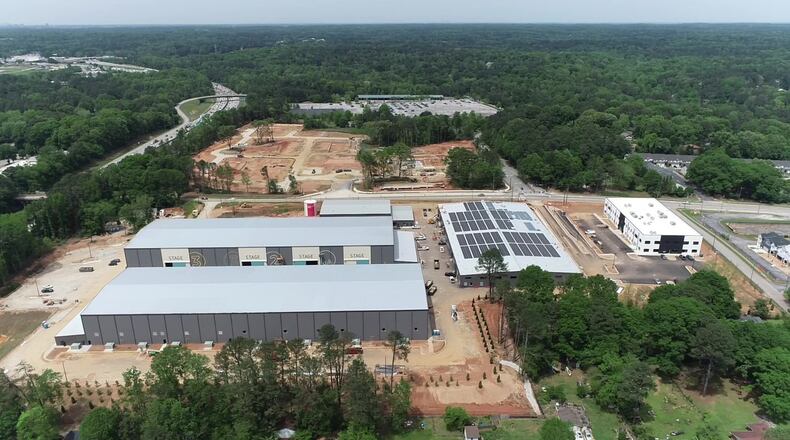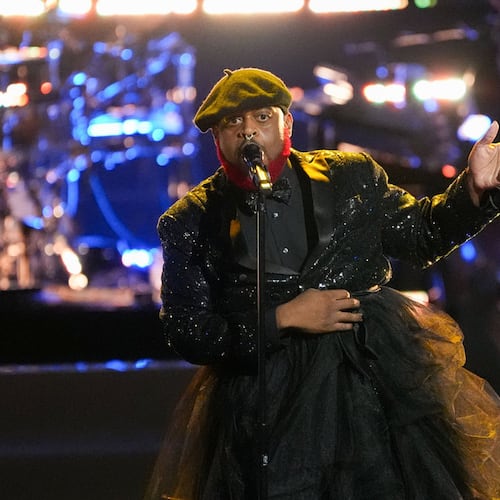Atlanta’s newest TV and film studio Electric Owl is touting itself as “sustainably focused” as its primary differentiator from other studios.
Opening June 8, the studio at 3963 Redan Road is notably close to Indian Creek MARTA station in DeKalb County near Decatur and will feature six purpose-built soundstages.
The studio’s environmental bonafides include LED lighting, 48 EV charging stations, solar panels, high efficiency HVAC, carbon-negative concrete, Styrofoam crushers, solar golf carts and water refill stations to minimize plastic bottle use. There will even be a food dehydrator that turns leftovers into landscaping mulch.
Caterers won’t be allowed to provide single-use condiment packets or water bottles. The janitorial and pest control companies they hired promise to only use certified green products. And they plan to offer an electric shuttle between the studio and the MARTA station.
Credit: ELECTRIC OWL STUDIOS
Credit: ELECTRIC OWL STUDIOS
Dan Rosenfelt and Michael Hahn, the two men who previously ran Third Rail Studios in Doraville (now owned by Gray Television), have been working on Electric Owl for more than three years.
“We wanted this to be the greenest studio in the world,” said Hahn in an exclusive interview with The Atlanta Journal-Constitution. “I think we achieved that.”
“This was not a marketing ploy,” added Rosenfelt. “We genuinely wanted to do something positive. Neither of us are life-long, die-hard environmentalists, but we do read a lot and we understand what’s going on in the world.”
Rosenfelt said making TV shows and films can be wasteful: “In the old days, they build sets, use lumber and materials and paint and toss it.”
Electric Owl will have non-profit organizations pick up lumber and other usable items after a set is dismantled.
Production companies, Hahn noted, have focused more on sustainability in recent years, but that doesn’t have to mean increased costs. Electric Owl, he said, won’t need to charge more to its clients than any other studio and will be market competitive: “There is no green fee. It’s just the amenities you get here.”
Hahn said they only spent about 1% more than they otherwise would have to make the studio green.
“That’s due to efficiencies in construction that have developed in recent years,” Hahn said. He noted that LED lighting is now standard and carbon-negative concrete costs the same as regular concrete. And the solar panels will offset 30% of the studio’s overall energy costs going forward.
The pandemic did not hold them back. “We’ve had very minor supply chain issues,” Hahn said. “The general contractor we work with has been amazing. We had an issue with transformers but were able to find another supplier. We also had some issues with concrete, but we were able to overcome that.”
Hahn said Electric Owl is the first TV and movie studio in town that is LEED (Leadership in Energy and Environmental Design) certified, which is handed out by the U.S. Green Building Council. “It’s a very long checklist of things you need to do,” Hahn said.
They are confident, even with the current writers strike that has already slowed production, to pick up a steady flow clients in the near future, having worked previously with the likes of Disney, Warner Bros. Discovery, NBCUniversal, Paramount, Sony, Netflix, Apple and Amazon, among others.
The team has already secured a second studio location in New York, an 18-acre site set to open in early 2025 and is currently halfway through the entitlement phase. They are hoping that studio will achieve LEED Gold certification, too.
And the hunt to make their studios more environmentally responsible will continue. “It’s a never-ending search,” Rosenfelt said. “It’s fun. We love the challenge. We work with a green consultant who stays on top of new technology and new ways to build.”
About the Author
Keep Reading
The Latest
Featured




